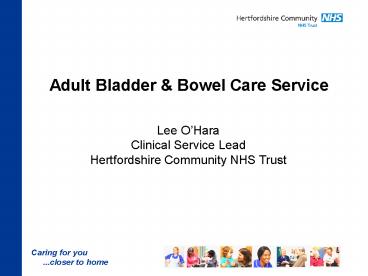Adult Bladder PowerPoint PPT Presentation
1 / 19
Title: Adult Bladder
1
Adult Bladder Bowel Care Service
Lee OHara Clinical Service Lead Hertfordshire
Community NHS Trust
2
Introduction
- Hertfordshire wide service
- 13 clinical staff covering allocated geographical
area - Administrative centre Park Drive Health Centre,
Baldock - Patient care clinics/home visits
- Education/training
- CAUTI lead for HCT Quality Priority
- Clinical policies for HCT staff Trust wide
- Management of continence product supply
3
Definition of Incontinence
- The International Continence Society define this
as - The involuntary loss of urine and/or faeces
that is a social or hygienic problem (2012)
4
Policy Statement
- Hertfordshire Community NHS Trust believes that
every adult has the right to advice and support
to achieve continence. - Where continence is not possible the most
appropriate management plan should be instigated.
5
Prevalence
- Urinary faecal incontinence increases with age
- More common in women than men
- Higher numbers of residents in care settings are
affected. Between 30-50 are incontinent. (Bale
2004) - 12 have faecal incontinence
- 3.4 of incontinent older people have
Incontinence Dermatitis (ID).(Zimmaro 2006)
6
Referral Criteria
- Adults with bladder bowel dysfunction not on a
core staff caseload - Complex patients requiring specialist support,
advice and treatment - Patients with problematic urinary catheters
- Patients within residential care settings
requiring assessment and/or continence products
7
Care Pathways
- Genuine Stress Incontinence females/males
- Overactive bladder
- Neurogenic bladder
- Obstructive bladder symptoms
- Bowel care constipation/faecal incontinence
- Mixed symptoms
8
Patient Care
- Clinics 15 sites across Hertfordshire
- Home visits own homes, residential care
9
Assessment (i)
- Incontinence is a symptom, not a diagnosis
- Assessment of the individuals incontinence is
crucial so that effective management can take
place
10
Assessment (ii)
- Holistic assessment to include
- Mobility
- Dexterity
- Dietary and fluid intake
- Family/carer support
- Sexual relationships
- Cultural issues
11
Assessment (iii)
- Cognitive ability
- Medical/Surgical/Obstetric history
- Quality of life
- As well as bladder and/or bowel symptoms
12
Assessment (iii)
- Bladder/Bowel diaries
- Pre and post void bladder scan
- Flowmetry
- Vaginal/pelvic floor muscle assessment
- Urinalysis
13
Treatment/Management options
- Lifestyle advice
- Biofeedback therapy pelvic floor muscle
physiotherapy - Bowel care anal irrigation
- Intermittent self catheterisation
- Indwelling catheter management
- Medication
- Appliance management (pads, sheaths)
14
Education/Training
- Formal/Informal training
- HCT clinical staff through the Learning
Development Department - Residential Care training programme for staff
- Local groups e.g. New Mums, Age Concern
15
CAUTI
- Catheter Associated Urinary Tract Infection
- Part of the NHS Safer Care programme
- Aim to reduce the numbers of infections in
catheterised patients - Adopted by HCT as a Quality Priority
- Bladder Bowel Service lead this important piece
of work through education, competency framework,
clinical policies
16
Clinical Policies
- Assessment of Bladder Bowel Dysfunction
Adults - Urinary Catheter Management
- Autonomic Dysreflexia
- Supply of Continence Products
17
Product Supply
- 10,000 adults children in receipt of continence
products throughout Hertfordshire - 1.9 million spent annually on products
delivery - Assessment based on clinical need currently
working with residential care staff - Policy is in place to ensure those requiring
products are given a contribution to their needs
supported by HCT Executive Board - Close monitoring of spend with regular updates to
Board - Queries/Complaints dealt with on individual basis
18
Patient Experience
- Comment cards monthly submissions to Patient
Experience Team - Surveys Hertfordshire wide schedule for the year
- Complaints product related
- You said, We did reflect changes made from
patient comments
19
- Thank you for your attention.
- Any questions?

